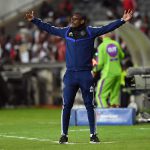Molefi Ntseki could be what Bafana Bafana needs
The former assistant coach of the South African men’s team was there at the start of Vision 2022. With the team at a crossroads, Ntseki could be just what phase two of the project needs.
Author:
29 August 2019

Molefi Ntseki sat still amid the chaos that lasted for almost half an hour. Technology refused to play ball in his first squad announcement as interim Bafana Bafana coach. The gathered press started whispering to fill the dead air. Those whispers turned into conversations and the conversations grew to loud chatter that filled Safa House in Nasrec, Johannesburg.
Ntseki was silent through it all, even when that chatter turned to him and the hot seat he wants to assume on a permanent basis. But once he started speaking, 20 minutes after he was scheduled to announce the Bafana squad that will take on Zambia in an international friendly on Saturday 7 September, he commanded everyone’s attention. Everyone except Safa technical director Neil Tovey, who continued to whisper like a naughty schoolboy.
The Bafana interim coach paid him no mind. This was an all too familiar sight having spent 10 years as a teacher, serving as a guidance counsellor and dealing with different students’ behaviour and their problems. Today was about winning over a certain portion of the class: the press. He did that with ease through his transparency, comprehension of what managing Bafana entails and going the extra mile to ensure that he has the buy-in of influential coaches in the country, including those touted as possible replacements for Stuart Baxter.
Related article:
Ntseki will look to win over the public and the South African Football Association (Safa) hierarchy in Lusaka in Bafana’s international friendly with Chipolopolo. He understands that he starts with a clean slate but that any setback will lead to doubts about whether he has what it takes to manage Bafana, especially as he hasn’t coached a first team in the Premier Division.
Even though Ntseki hasn’t served as head coach in the elite league, he has extensive experience in a coaching career that spans more than two decades. He has managed in the Africa Cup of Nations (Afcon) at Under-17, Under-20, Under-23 and senior national team level, albeit as assistant coach in most of those tournaments. He started the Harmony Sports Academy, which has nurtured talents like Teboho Mokoena and Sipho Mbule. He also worked as an assistant coach at Bloemfontein Celtic, scouting Thapelo Morena at the SAB Under-21 National Championships in Nelspruit.
Taming the Bafana beast
But Bafana Bafana is a different beast altogether. The pressure turns the most sane man senile. The presidency is a picnic compared with managing Bafana where the future is uncertain, there are millions of opinions to deal with and once a motion of no-confidence is presented against you, there is no coming back.
“In South Africa, we have a background of negativity because of the history of this country,” Ntseki said. “It is upon us as South Africans to turn things around and be positive. The people who can do better are the leaders in this country. In my understanding of the South African demographics, the media plays an important role. It’s either the media will paint a positive picture of Bafana Bafana and the coaches, or will have a problem with the coach and go out to say that we aren’t winning and we aren’t getting things right.
“I am seated here, I haven’t played a match and I haven’t lost a friendly. I know that I have all the support. But immediately when something goes wrong – it’s football, you either win, draw or lose – people will then say we don’t think that he is the right person for the job. But at the beginning, because you haven’t made any mistakes, they will say let’s give him a chance.
“Giving me a chance means that I will be making mistakes as a person, all that’s important is that I have to own up. If I have made a mistake, I must accept that I have made a mistake on this one. I am saying, South Africans, let’s support our team.”
Related article:
Ntseki isn’t the sexy option in the search for the next Bafana coach. Safa have come out to say that they are looking to hire a local coach. Pitso Mosimane, Gavin Hunt, Benni McCarthy and Steve Komphela’s names have been mentioned among the possible candidates. But if Safa wants a continuation of Vision 2022, then Ntseki, the man who laid the foundation for that masterplan by guiding Amajimbos to the 2015 Under-17 Fifa World Cup in Chile, is the right man.
The problem is that Safa and the country are obsessed with a brand name and not necessarily what that brand name brings. This was evident when it appointed Baxter after failing to secure any of the three “brands” they had shortlisted. In settling for Baxter, they took two steps back in their Vision 2022, as the British coach didn’t have a track record of trusting young players. He went to Egypt with the second-oldest squad at the Afcon, going against the ideals of Vision 2022, which included blooding young talent. Ntseki isn’t a brand because he has slaved away in the background. But his work with youngsters is impressive.
The Botshabelo-born coach doesn’t only have an eye for talent, he also knows how to manage that talent as the holder of a psychology degree from the now defunct Vista University. When asked how he will manage Kermit Erasmus, the talented but temperamental striker who once stated that he isn’t a backup player after refusing a late call-up to replace a no-show in the Bafana camp, Ntseki drew on a familiar situation to answer the question.
Tapping into the players’ mindset
The 50-year-old said that Ermasmus, who he has worked with since he was 16, is like an intelligent student who gets bored easily, and when he isn’t given attention he is troublesome. As a former teacher, he knows what to do to deal with such behaviour. But he ended his response with an ominous line: “At the end of the day, I am the head coach and he is the player. We need to have that understanding and respect for each other.
“Coaching is teaching and teaching, for you to be good at it, you have to have a positive rapport with the people you are working with,” Ntseki said. “That’s what I learned in life, that whenever you are working with somebody, don’t explain his personality but instead try to understand his personality.
“I was saying the other day that the most difficult job one can do is to be an assistant coach, because it is not about you. It is about the person that you are working with. It is about the support that you have to give to that person. It is about creating an environment of trust without creating tension and animosity working with that person.
“Teaching has helped me because in teaching you have teachers with different backgrounds and personalities. Some of them, you end up treating like your brother and your sister, because at times you have to call them to order and at times you call to order someone who is your senior because they aren’t doing the right things. It’s the same with football.
“When you work with coach Stuart, coach Owen [da Gama], coach Shakes [Mashaba], coach Serame [Letsoaka] and coach Khabo Zondo, those are senior people that I worked with. If you have to advise them on something, you have to do so with respect and say that this is what I think, how do you see it? Can it work for us? If he feels that it’s not going to work for us, you must take it in and still be supportive.”
Related article:
Ntseki continued, “Some years ago, we used to take sticks to class and when you don’t get the answers right we will give you a smack. But we then said corporal punishment has been abolished, that meant you can’t punish somebody until that person understands the mistake or whatever wrong they have done and accepts it. That’s when you can say, now that you accept that you made a mistake and this shouldn’t happen, this is the punishment. They will take the punishment with ease and they will understand that I shouldn’t do it again.
“During the game, players have a way of doing things. Just get closer to them and say, is this how we want it to be done? Is this how we want to win this match? Just remember how we worked around this. And they will always appreciate. Get them involved, they will appreciate, they will support and they will own up.”
Working his way up
Ntseki started his tenure in the national team as an assistant coach to Letsoaka with Amajita, who reached the last 16 of the 2009 Under-20 World Cup in Egypt. They remain the best-performing South African football side at a World Cup. Erasmus, Darren Keet, Ramahlwe Mphahlele, Thulani Hlatshwayo, Kamohelo Mokotjo and Thulani Serero were in that squad and Ntseki has named them in the team to face Zambia.
Keet, Mphahlele, Hlatshwayo, Mokotjo and Serero were with Ntseki in Egypt in the Afcon with Bafana 10 years after their exploits with the Under-20 national team. Letsoaka visited them in their hotel in Cairo and the seven of them, along with team manager Barney Kujane, took a picture together as they rolled back the years to a decade ago in the Land of the Pharaohs. That bond should make Ntseki’s audition easier.
“I spoke to them when coach Serame came to visit us in Egypt. He took a photo with the five who were at the Under-20 World Cup. I said to them that it is not only about the coaches understanding you as South Africans, but it is also important for you as players to understand the coach, because if we have that mutual understanding we won’t have issues in camp or people saying that he isn’t playing me because he doesn’t understand me. If we are to build a strong footballing country, let’s get to the level where the coach also needs to be understood.”
It was a bold move for Ntseki to raise his hand for consideration as Bafana coach because it means he is unlikely to continue to assist should he not get the head coach position. The next man in charge would undoubtedly find it difficult to trust him knowing that he was after the top seat. The question then becomes, why is he raising his hand now?
“It is because of the path that I started 21 years ago, when I started coaching formally in 1998 in September,” Ntseki said. “When I look back, I can see my footprints. But when I look forward, I see a forest and I have to negotiate my way in this forest and get past it. That’s why it is happening now.
“Bafana Bafana to me is a forest. I don’t know what is inside the forest, but I know that I have the confidence and belief that I can negotiate my way in this forest. I don’t know what’s in there, if there are lions, well then, I am a lion myself. I was born in August. I am a Leo. Maybe I will negotiate better.
“They always say that a new broom sweeps clean. I hope that I am not a new broom. I am an old broom that has ideas and new ways of doing things without taking anything from anybody who was here before me.”



